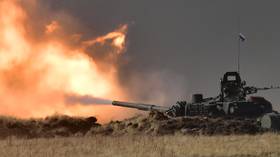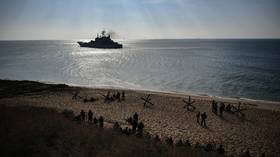‘Russian troops dismember the armed forces of Ukraine’: how a war between Moscow & Kiev could play out, and why it won’t happen
27 Nov, 2021 11:12 / Updated 7 hours ago

That’s according to Valdai Club Programme Director Ivan Timofeev. The top Moscow think tank is closely connected with President Vladimir Putin. Timofeev, one of Russia’s leading foreign experts, is skeptical about the possibility of a conflict, but he has outlined how such an operation could be conducted.
One scenario could look like this:
With a sudden and decisive blow in several directions at once, Russian troops dismember the armed forces of Ukraine in the east of the country, surround separate groups, or press them against the Dnieper river. The actions of tank and motorised units are accompanied by powerful air, missile and artillery strikes. The Russian Aerospace Forces seize air supremacy.
The apotheosis of the operation should be the encirclement and the subsequent capture of Kiev, and the stabilisation of the front line along the Dnieper. The creation of a new Ukrainian state with its capital in Kiev would be announced and recognised by Russia. It would include the previously independent DPR and LPR.
Russia thereby resolves several historical problems at once. The immediate threat to the southwestern borders is removed. Full control over the Sea of Azov and a land corridor to the Republic of Crimea are ensured. Two Ukrainian states appear on the map, one of which should be ‘friendly and fraternal.’
However, in Timofeev’s opinion, this course of action is very unlikely, as the costs for Russia would outweigh any possible benefits:
First, such a military conflict is unlikely to culminate in any intelligible agreement. A victory over the armed forces of Ukraine will not by itself lead to a fast peace. The war could develop into a long and sluggish confrontation.
Second, the conflict would inevitably lead to a sharp change in the Western approach toward providing Ukraine with modern weapons and military equipment. Large-scale military aid from the West would prolong the conflict. The United States and its allies will not enter open military confrontation with Moscow. However, the level of support for the Ukrainian army will grow significantly.
Third, regarding the Ukrainian issue, Russia would find itself in diplomatic isolation. It is unlikely that any country would voice support for Moscow’s actions. Unlike Crimea and Donbass, we’re talking about a large-scale and open clash between the armed forces, that is, about a fully fledged war. Russia would certainly be on the offensive. This would allow its actions to be classified as aggression without any problems.
Fourth, all key Western players would introduce qualitatively new sanctions and restrictions against Russia. The cumulative damage to the Russian economy would be colossal in scale.
Fifth, controlling Ukraine, even its eastern part, could be problematic. Taking into account the Western sanctions blockade, any transactions with the territories of Ukraine under Russian control would be impossible. Russia would have to take on a huge territory.
Sixth, the loyalty of the population of Eastern Ukraine to Russia is not obvious. Despite all the internal disagreements, over the past 30 years, Ukraine has developed its own civic identity. The population of the eastern regions may have a negative attitude towards excessive nationalism. However, this does not guarantee their loyalty to Russia.
Finally, seventh, the war is fraught with destabilisation of the situation inside Russia itself. There is no demand in society for a war with a neighbour, even despite the odiousness of the anti-Russia discourse in Ukraine.
The question arises — to whom and under what conditions is this scenario beneficial? First of all, it is attractive precisely as a hypothetical rather than a real situation. In this form, it makes it possible to consolidate Ukraine on an anti-Russian basis, to seek the expansion of Western military aid, and to justify such aid to the West. The threat of war and an exercise of power can also be used by the Russian side. Moscow shows that it is technically ready for a radical scenario and will not allow its “red lines” to be crossed. These “red lines” include a military solution to the Donbass problem. In other words, the scenario has a practical meaning as a tool for information warfare and political signals.
From the point of view of the balance of benefits and losses, neither side is interested in a real war. Therefore, it is hardly worth considering the war scenario as a likely one. However, history knows many examples when rational calculations have failed to put an end to escalation. There is only the hope that this isn’t the case here.
This is an abridged version of Ivan Timofeev’s article. The full text can be found here.


0 Comments:
Post a Comment
Subscribe to Post Comments [Atom]
<< Home